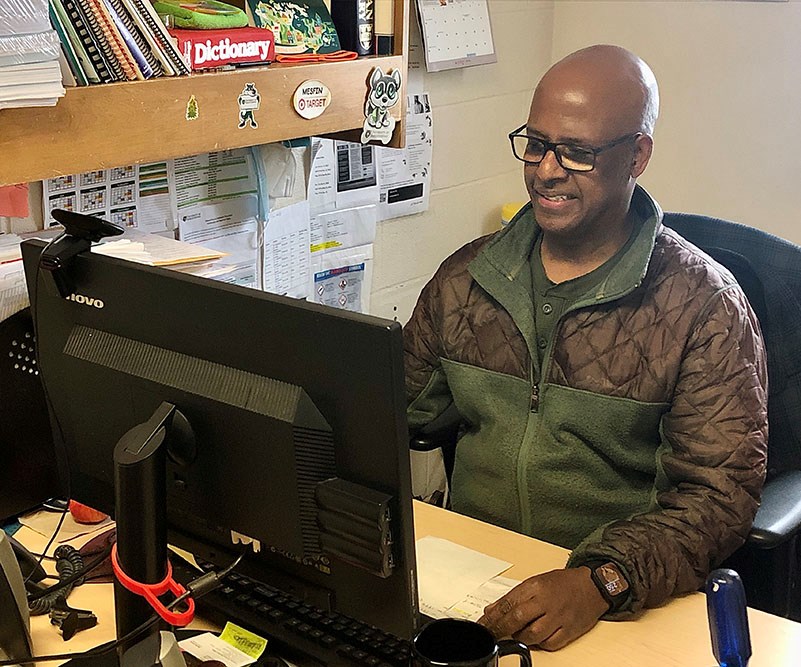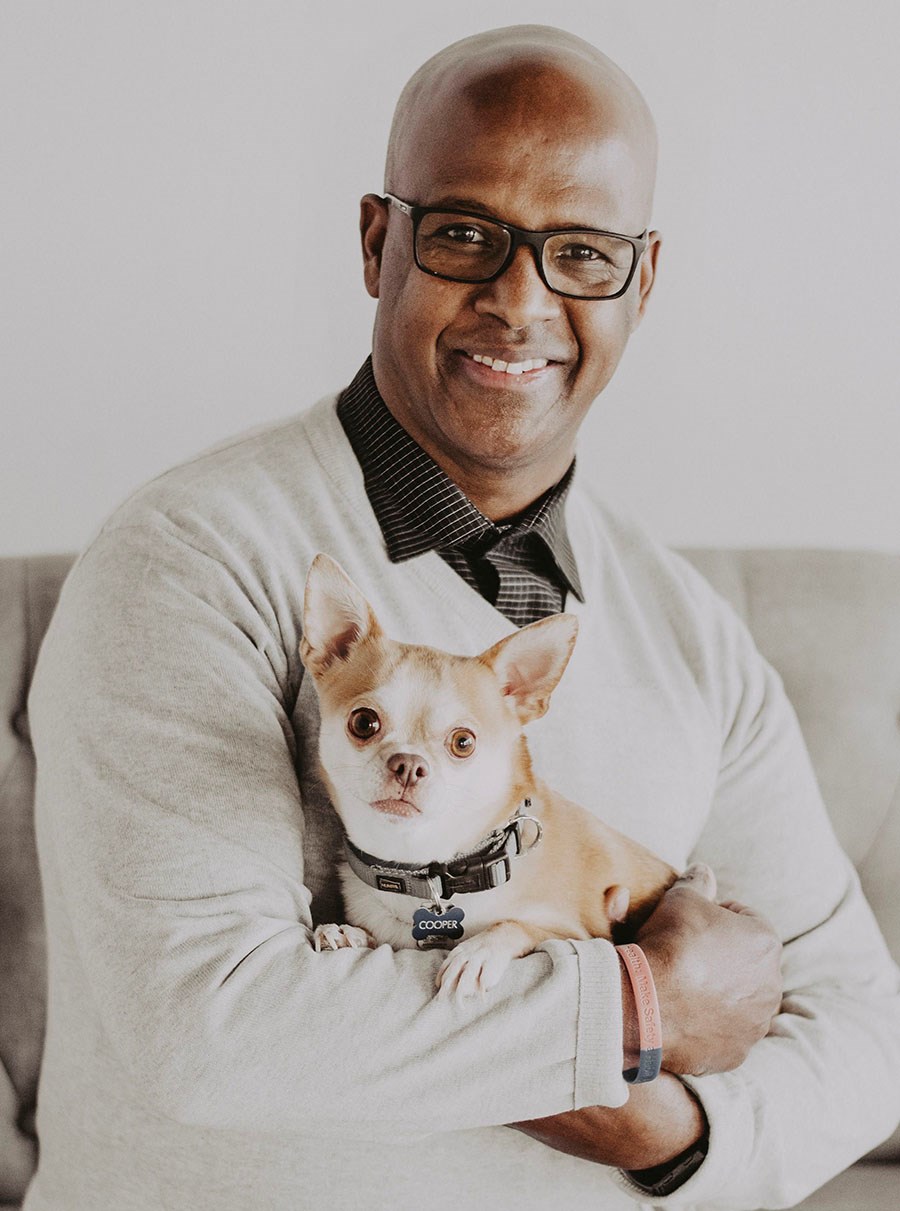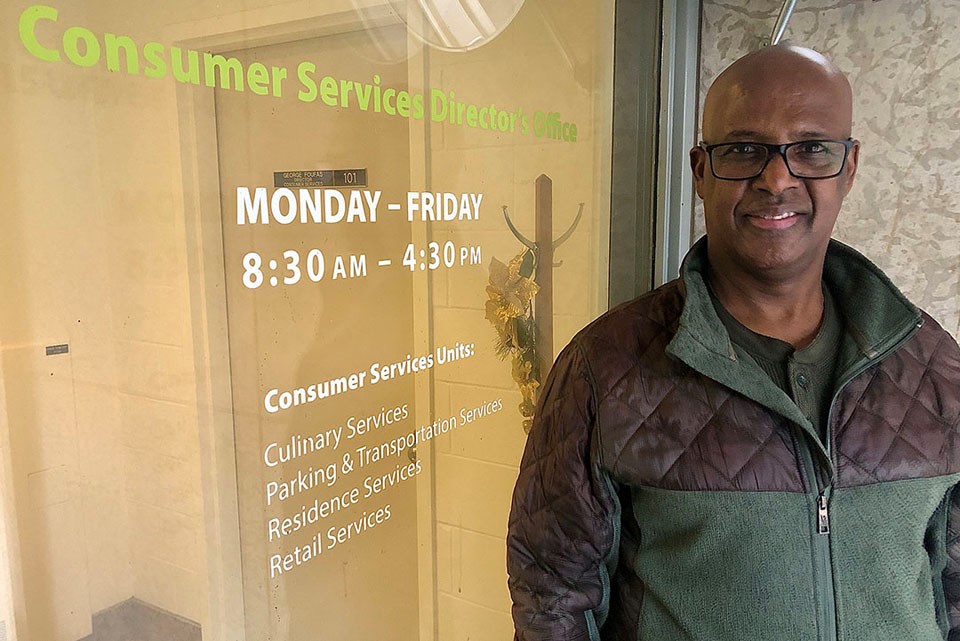SASKATOON — Growing up in the subtropical African country of Ethiopia, Mesfin Gossa never imagined his future would take him halfway around the world.
But 36 years after arriving in Saskatchewan with his wife Azeb, and 31 years after beginning his career at the University of Saskatchewan (USask), Gossa looks back with pride on his life-changing decision to call Saskatoon home.

Mesfin Gossa started his career at USask back in 1989 and now serves as manager of Residence Services in Consumer Services. | Photo by James Shewaga
“I started from scratch and that is why I like the life here,” said Gossa, who started at USask in March of 1994 and has worked his way up through three decades on campus to the role of manager of Residence Services. “I have lived in Africa and Europe in big cities, but it is not easy, and it is so expensive. Many (Ethiopians) wanted to go to the United States, but I just somehow always wanted to go to Canada, even though they told me it was cold, it didn’t stop me. I said I would take a chance. We came to Saskatoon in 1989 and all this time it has been our home. We have travelled everywhere, but this is home.”
From decades of civil war and years of famine that killed more than a million people, to being ruled by a Soviet-backed military junta, life in Ethiopia was difficult and dangerous in the 1980s, particularly in the crowded capital city of Addis Abada – home to 5.7 million people. But escaping the country at that time was risky at best.
“I know in my younger age, if you tried to cross the border, to Djibouti, Sudan, or Kenya, any neighbouring country, it was very hard,” Gossa said. “You take a 50-50 chance that you will die – an animal will kill you or someone will kill you. We know a lot of friends who weren’t successful and disappeared.”
Gossa chose another path, serving his country by teaching in rural and remote areas of Ethiopia – in order to secure a visitor’s visa to leave the country, and in his case, to never return.
“I left Ethiopia when I was 24 years old and when we left the country in 1986, we left because of the political situation,” said Gossa. “It was a communist government, so at that time there wasn’t a lot of services, and during that time there was also a war. We wanted to leave for a better life.”

University of Saskatchewan manager of Residence Services Mesfin Gossa with his wife Azeb in their Saskatoon home. | Photo courtesy USask
Gossa’s life-changing journey began on March 13, 1986, when he flew from Ethiopia to Greece, and immediately applied for refugee status with the United Nations. For three years, they lived in Athens in a small, rented basement room, with Mesfin working odd jobs as a handyman and carpenter, without knowing what the future had in store for them.
After three long years of refugee processing, they finally secured immigration status to come to North America and were faced with another life-changing decision:
“At that time there were two choices: one was to go to Chicago and one was to go to Canada,” Gossa recalled. “I wanted a family, so I know I picked the right place. I remember during the interview with the immigration officer he said, do you know anything about Saskatchewan? I said, no. He said it is very, very cold, I don’t know how you will stand it. And I said, do people live there? And he said, yes, people live there. So I said if they can live there, then we can learn to live there, too. So we got our visa and went from Athens to Rome to Toronto and then to Saskatoon, where there was an immigration officer waiting for us.”
So began the start of building their new life together in a new world in Saskatoon in 1989, from working together as cleaners in the evenings, to Gossa earning $5 an hour at a plastic company. After studying Canadian culture history and passing their citizenship test, they officially became Canadian citizens in 1992.
“We went to city hall for the ceremony and then we were Canadian citizens,” Gossa recalled, with a smile.
A year later, came the first of many more milestone moments as the Gossas became parents for the first time when Azeb gave birth to their first daughter, Sara, in 1993 and to their second daughter, Aida, in 1995, the year they also bought their first home. The Gossas would later proudly watch Sara graduate from USask with a bachelor’s degree in 2018 and go on to work with children in Alberta, while Aida studied criminology and started her career on campus and now serves as a dispatcher in Saskatchewan. In 2024, Aida married her husband Jesse in Saskatoon and gave birth to their daughter – the first grandchild in the family.
“Our happy life is here,” said Gossa. “We are thankful to be here.”

USask staff member Mesfin Gossa (left), son-in-law Jesse holding his granddaughter, daughter Aida, wife Azeb, and daughter Sara. | Photo courtesy USask
USask also quickly became home away from home for Gossa, who is grateful for the support he has received throughout the years on campus. With a simple philosophy of always working hard and being thankful for every day, Gossa’s career has advanced from beginning as a caretaker to serving in a management role, constantly upgrading his education and training to prepare for more senior responsibilities.
“I believe in hard work and I always appreciated all of my bosses, they always supported me and opened their hearts,” he said. “I think that is one thing that I have always appreciated at the university. Nobody ever closed a door for me. We always worked together and I always received new opportunities.”
Gossa also embraced new opportunities outside of the office, cheering on the Huskie football team from the stands at Griffiths Stadium and serving as a volunteer when the Huskies hosted the men’s hockey nationals in Saskatoon in 2013 and 2014. Gossa has also become a follower of the Toronto Maple Leafs over the years, a fan of the Saskatoon Blades and a supporter of the Saskatchewan Roughriders, while also continuing to pursue his passion for his first sport – soccer.
“I am a soccer player all my life, so I am still playing at the soccer centre,” said Gossa, who at the age of 62 still takes to the pitch as a player with the Whiskey Jacks master’s men’s soccer team in Saskatoon. “And the Roughriders are my football team. I went to the Grey Cup in Regina in 2013 when they won at Mosaic Stadium.”
Gossa has also embraced a love for the outdoors in winter, discovering a Prairie passion for ice fishing.
“I like outdoor activities and I always go ice fishing, so the cold doesn’t bother me,” he said. “It is cold, but you just have to make sure to prepare yourself and have the gear. You just have to adapt.”

Long-serving University of Saskatchewan employee Mesfin Gossa with his pet Chihuahua Cooper. | Photo courtesy USask
Adapting has never been a problem for Gossa, who quickly adjusted to a new home and new way of life far from home in Ethiopia. As USask recognizes Black History Month throughout February, Gossa appreciates that Canada welcomes newcomers from around the world and enjoys the international flavour and multicultural nature of campus, featuring students and staff from more than 120 countries around the globe.
“I have worked with lots of people and they were all supportive and right now I have 25-30 employees working for me – White Canadians, Filipinos, Black people. I just work and fit in with everyone. I can’t change my colour, we are all humans, so it’s about respect. It is good to have that (Black History Month) recognition. That history is always there, and I also respect the (Indigenous) history and that we are all immigrants here.”
As he approaches his 63rd birthday this year, Gossa shows no signs of slowing down. While his wife retired last year after serving for more than 30 years in the health-care profession, at this point Gossa is in no rush to join her.
“I don’t know when I will (retire),” said Gossa, with a smile. “I am still OK. I always focus on the work and I am also always active. I work out, and I burn the calories – 1,500 a day – walking around campus and going up and down stairs making sure all the students are happy every year in the residences. I have had a very good opportunity here at the university and I am always happy to be here.”
— Submitted by USask Media Relations

